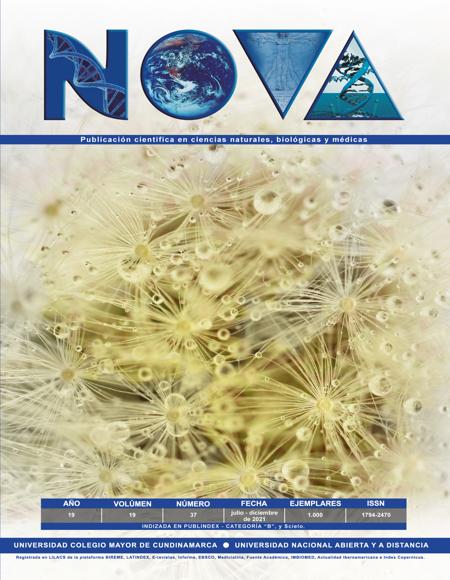Chimeric antigen receptor-natural killer cells: novel therapy against cancer
Células asesinas naturales con el receptor de antígeno quimérico (CAR-NK): terapia emergente contra el cáncer
NOVA by http://www.unicolmayor.edu.co/publicaciones/index.php/nova is distributed under a license creative commons non comertial-atribution-withoutderive 4.0 international.
Furthermore, the authors keep their property intellectual rights over the articles.
Show authors biography
One of the novel and effective devices against leukemia and solid tumors in adoptive immunotherapies is the use of the chimeric antigen receptor “CAR”. CAR technology has been widely used in T-cells (CAR-T cells) empowering its efficacy on the identification and elimination of tumor cells, getting today certain drugs based on this technology. Nevertheless, CAR-T cells can have a negative impact on patient health, causing in many cases immune effector cell-associated neurotoxicity syndrome (ICANS) and cytokine release syndrome (CRS). As a consequence, the patient will have to be hospitalized for the duration
of therapy. Moreover, the cost of manufacture and therapy is quite expensive, limiting its use to a low range of people. On the other hand, we analyze the advantages of Natural Killer cells with the CAR receptor (CAR-NK), which have many plusses over CAR-T cells. CAR-NK cells retain their cytotoxic abilities against tumor cells due their activator/ inhibitor receptors balance. Thus, the CAR receptor technology just increases their skills and persistence. Furthermore, CAR-NK therapy could be more profitable since CAR-NK can eliminate multiple tumor cells without generating collateral damage on patient health. Here, we discuss the characteristics of the multiples CAR receptors in general and the NK types cells that have been used in trials demonstrating their viable emerging therapy (NK92, cord and peripheral blood NK cells, and iPSC-derived NK cells).
Article visits 272 | PDF visits 219
Downloads
1. Zhang C, Oberoi P, Oelsner S, Waldmann A, Lindner A, Tonn T, el al. Chimeric Antigen Receptor-Engineered NK-92 Cells: An Off-the-Shelf Cellular Therapeutic for Targeted Elimination of Cancer Cells and Induction of Protective Antitumor Immunity. Front Immunol. 2017;8(533). doi: 10.3389/fimmu.2017.00533.
2. Habib S, Tariq SM, Tariq M. Chimeric Antigen Receptor-Natural Killer Cells: The Future of Cancer Immunotherapy. Ochsner J. 2019;19(3):186-187. doi: 10.31486/toj.19.0033.
3. Daher M, Basar R, Gokdemir E, Baran N, Uprety N, Nunez Cortes AK, et al. Targeting a cytokine checkpoint enhances the fitness of armored cord blood CAR-NK cells. Blood. 2021;137(5):624-636. doi: 10.1182/blood.2020007748.
4. Daher M, Rezvani K. Next generation natural killer cells for cancer immunotherapy: the promise of genetic engineering. Curr Opin Immunol. 2018;51:146-153. doi: 10.1016/j.coi.2018.03.013.
5. Pfefferle A, Huntington ND. You Have Got a Fast CAR: Chimeric Antigen Receptor NK Cells in Cancer Therapy. Cancers (Basel). 2020;12(3):706. doi: 10.3390/cancers12030706.
6. Glienke W, Esser R, Priesner C, Suerth JD, Schambach A, Wels WS, et al. Advantages and applications of CAR-expressing natural killer cells. Front Pharmacol. 2015;6:21. doi: 10.3389/fphar.2015.00021.
7. Sadelain M, Brentjens R, Rivière I. The basic principles of chimeric antigen receptor design. Cancer Discov. 2013;3(4):388-98. doi: 10.1158/2159-8290.CD-12-0548
8. Barrett DM, Singh N, Porter DL, Grupp SA, June CH. Chimeric antigen receptor therapy for cancer. Annu Rev Med. 2014;65:333-47. doi: 10.1146/annurev-med-060512-150254.
9. Stone JD, Chervin AS, Kranz DM. T-cell receptor binding affinities and kinetics: impact on T-cell activity and specificity. Immunology. 2009;126(2):165-76. doi: 10.1111/j.1365-2567.2008.03015.x.
10. Bridgeman JS, Hawkins RE, Hombach AA, Abken H, Gilham DE. Building better chimeric antigen receptors for adoptive T cell therapy. Curr Gene Ther. 2010;10(2):77-90. doi: 10.2174/156652310791111001.
11. Chmielewski M, Abken H. TRUCKs: the fourth generation of CARs. Expert Opin Biol Ther. 2015;15(8):1145-54. doi: 10.1517/14712598.2015.1046430.
12. Liu E, Marin D, Banerjee P, Macapinlac HA, Thompson P, Basar R, et al. Use of CAR-Transduced Natural Killer Cells in CD19-Positive Lymphoid Tumors. N Engl J Med. 2020;382(6):545-553. doi: 10.1056/NEJMoa1910607.
13. Daher M, Rezvani K. Outlook for New CAR-Based Therapies with a Focus on CAR NK Cells: What Lies Beyond CAR-Engineered T Cells in the Race against Cancer. Cancer Discov. 2021;11(1):45-58. doi: 10.1158/2159-8290.CD-20-0556.
14. Krause A, Guo HF, Latouche JB, Tan C, Cheung NK, Sadelain M. Antigen-dependent CD28 signaling selectively enhances survival and proliferation in genetically modified activated human primary T lymphocytes. J Exp Med. 1998;188(4):619-26. doi: 10.1084/jem.188.4.619.
15. Eshhar Z, Waks T, Bendavid A, Schindler DG. Functional expression of chimeric receptor genes in human T cells. J Immunol Methods. 2001;248(1-2):67-76. doi: 10.1016/s0022-1759(00)00343-4.
16. Milone MC, Fish JD, Carpenito C, Carroll RG, Binder GK, Teachey D, et al. Chimeric receptors containing CD137 signal transduction domains mediate enhanced survival of T cells and increased antileukemic efficacy in vivo. Mol Ther. 2009;17(8):1453-64. doi: 10.1038/mt.2009.83.
17. Till BG, Jensen MC, Wang J, Qian X, Gopal AK, Maloney DG, et al. CD20-specific adoptive immunotherapy for lymphoma using a chimeric antigen receptor with both CD28 and 4-1BB domains: pilot clinical trial results. Blood. 2012;119(17):3940-50. doi: 10.1182/blood-2011-10-387969.
18. Cairo MS, Coiffier B, Reiter A, Younes A; TLS Expert Panel. Recommendations for the evaluation of risk and prophylaxis of tumour lysis syndrome (TLS) in adults and children with malignant diseases: an expert TLS panel consensus. Br J Haematol. 2010;149(4):578-86. doi: 10.1111/j.1365-2141.2010.08143.x.
19. Bollino D, Webb TJ. Chimeric antigen receptor-engineered natural killer and natural killer T cells for cancer immunotherapy. Transl Res. 2017;187:32-43. doi: 10.1016/j.trsl.2017.06.003.
20. Bear AS, Morgan RA, Cornetta K, June CH, Binder-Scholl G, Dudley ME, et al. Replication-competent retroviruses in gene-modified T cells used in clinical trials: is it time to revise the testing requirements? Mol Ther. 2012;20(2):246-9. doi: 10.1038/mt.2011.288.
21. Zhang C, Burger MC, Jennewein L, Genßler S, Schönfeld K, Zeiner P, et al. ErbB2/HER2-Specific NK Cells for Targeted Therapy of Glioblastoma. J Natl Cancer Inst. 2015;108(5). doi: 10.1093/jnci/djv375.
22. MacLeod RA, Nagel S, Kaufmann M, Greulich-Bode K, Drexler HG. Multicolor-FISH analysis of a natural killer cell line (NK-92). Leuk Res. 2002;26(11):1027-33. doi: 10.1016/s0145-2126(02)00055-3.
23. André P, Denis C, Soulas C, Bourbon-Caillet C, Lopez J, Arnoux T, et al. Anti-NKG2A mAb Is a Checkpoint Inhibitor that Promotes Anti-tumor Immunity by Unleashing Both T and NK Cells. Cell. 2018;175(7):1731-1743.e13. doi: 10.1016/j.cell.2018.10.014.
24. Kamiya T, Seow SV, Wong D, Robinson M, Campana D. Blocking expression of inhibitory receptor NKG2A overcomes tumor resistance to NK cells. J Clin Invest. 2019;129(5):2094-2106. doi: 10.1172/JCI123955.
25. Björklund AT, Carlsten M, Sohlberg E, Liu LL, Clancy T, Karimi M, et al. Complete Remission with Reduction of High-Risk Clones following Haploidentical NK-Cell Therapy against MDS and AML. Clin Cancer Res. 2018;24(8):1834-1844. doi: 10.1158/1078-0432.CCR-17-3196.
26. Knorr DA, Ni Z, Hermanson D, Hexum MK, Bendzick L, Cooper LJ, et al. Clinical-scale derivation of natural killer cells from human pluripotent stem cells for cancer therapy. Stem Cells Transl Med. 2013;2(4):274-83. doi: 10.5966/sctm.2012-0084.
27. Valamehr B, Robinson M, Abujarour R, Rezner B, Vranceanu F, Le T, et al. Platform for induction and maintenance of transgene-free hiPSCs resembling ground state pluripotent stem cells. Stem Cell Reports. 2014;2(3):366-81. doi: 10.1016/j.stemcr.2014.01.014.
28. Saetersmoen ML, Hammer Q, Valamehr B, Kaufman DS, Malmberg KJ. Off-the-shelf cell therapy with induced pluripotent stem cell-derived natural killer cells. Semin Immunopathol. 2019;41(1):59-68. doi: 10.1007/s00281-018-0721-x.
29. Kruschinski A, Moosmann A, Poschke I, Norell H, Chmielewski M, Seliger B, et al. Engineering antigen-specific primary human NK cells against HER-2 positive carcinomas. Proc Natl Acad Sci U S A. 2008;105(45):17481-6. doi: 10.1073/pnas.0804788105.
30. Han J, Chu J, Keung Chan W, Zhang J, Wang Y, Cohen JB, et al. CAR-Engineered NK Cells Targeting Wild-Type EGFR and EGFRvIII Enhance Killing of Glioblastoma and Patient-Derived Glioblastoma Stem Cells. Sci Rep. 2015;5:11483. doi: 10.1038/srep11483.
31. MacKay M, Afshinnekoo E, Rub J, Hassan C, Khunte M, Baskaran N, et al. The therapeutic landscape for cells engineered with chimeric antigen receptors. Nat Biotechnol. 2020;38(2):233-244. doi: 10.1038/s41587-019-0329-2.
32. Hanenberg H, Xiao XL, Dilloo D, Hashino K, Kato I, Williams DA. Colocalization of retrovirus and target cells on specific fibronectin fragments increases genetic transduction of mammalian cells. Nat Med. 1996;2(8):876-82. doi: 10.1038/nm0896-876.
33. Davis HE, Morgan JR, Yarmush ML. Polybrene increases retrovirus gene transfer efficiency by enhancing receptor-independent virus adsorption on target cell membranes. Biophys Chem. 2002;97(2-3):159-72. doi: 10.1016/s0301-4622(02)00057-1.
34. Xiao L, Cen D, Gan H, Sun Y, Huang N, Xiong H, et al. Adoptive Transfer of NKG2D CAR mRNA-Engineered Natural Killer Cells in Colorectal Cancer Patients. Mol Ther. 2019;27(6):1114-1125. doi: 10.1016/j.ymthe.2019.03.011.
35. Rostovskaya M, Fu J, Obst M, Baer I, Weidlich S, Wang H, et al. Transposon-mediated BAC transgenesis in human ES cells. Nucleic Acids Res. 2012;40(19):e150. doi: 10.1093/nar/gks643.
36. Kebriaei P, Izsvák Z, Narayanavari SA, Singh H, Ivics Z. Gene Therapy with the Sleeping Beauty Transposon System. Trends Genet. 2017;33(11):852-870. doi: 10.1016/j.tig.2017.08.008.






